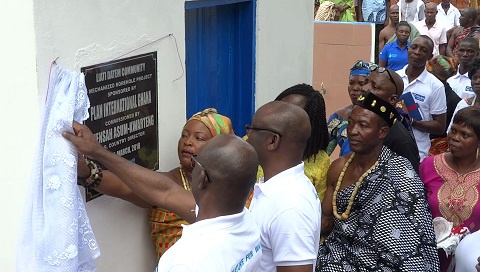General News of Thursday, 22 March 2018
Source: Fred Quame Asare
Intensify campaign on galamsey and urban waste - Plan International Ghana Boss
As the world marks World Water Day, the Acting Country Director of Plan International Ghana, Asum-Kwarteng Ahensah, has implored government to intensify the fight against illegal small-scale mining (galamsey) and urban waste.
According to Mr Ahensah, galamsey and urban waste are the most destructive human activities that risk the existence of the country’s nature cover and water bodies hence must be tackled head-on.
He, therefore, advocated that the Operation Vanguard should adopt the “seize and forfeit” policy of galamsey equipment as a means of fighting the menace instead of the “shoot and kill” policy suggested.
Speaking at a ceremony to commemorate the World Water Day and also commission some Water and Sanitation Projects in Liati Datem in the Afadzato South District of the Volta Region, Mr Ahensah said “the fight against galamsey and urban waste must be intensified to protect our water bodies. Galamsey must be made as unattractive as possible to everyone.”
He further stated that “while I don’t support the suggested shoot and kill policy, I strongly advocate the siege and forfeit policy of galamsey equipment”.
He also advised that government’s 1-district, 1-factory Policy should focus on urban waste management which will significantly contribute to improve on the 15% sanitation coverage in the country adding urban waste processing factories must be given special tax and incentives.
“This focused and linkage approach will create opportunities for job and income creation, and increase food security. More importantly, it will protect the most important asset: nature, including our water bodies”, he added.
Meanwhile, Plan International Ghana has constructed 10 5 seater girl-friendly sanitary facilities, 5 mechanised borehole and 5 hand pumps in some 10 communities in the Afadzato South District of the Volta Region.
The initiative which is being implemented under the outfit’s 3-year Integrated Water, Sanitation and Hygiene (IWASH) Project was to enhance eradicate open defecation and ensure female pupils remain in school.
Community members were also encouraged to construct latrines in their homes.



Business















